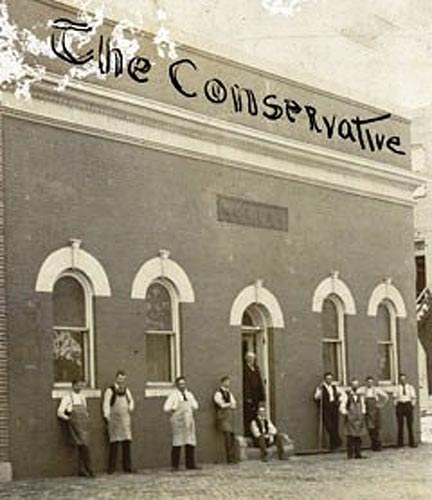J. Sterling Morton (1832-1902) had a distinguished political career in this state, serving twice in the territorial legislature, as territorial secretary from 1858 to 1861, and on two occasions as acting territorial governor. He also served as secretary of the U.S. Department of Agriculture under President Grover Cleveland from 1893 to 1897. His chief legacy, however, is his promotion of tree planting on the prairies, and upon his initiative, the State Board of Agriculture in 1872 established Arbor Day.
In 1898 Morton established The Conservative, a weekly, three-column newspaper, in his hometown of Nebraska City to further his economic and political views and to promote agriculture and tree planting. He surely would have applauded the modern advent of the artificial Christmas tree, for on November 23, 1899, he used his newspaper to attack the custom of cutting down healthy trees for use as holiday decorations. Morton wrote:
“Mutilation and destruction of the young pine forests growing up in various sections of the republic, for the purpose of getting Christmas trees, will soon open a new campaign in favor of drouths, blizzards and infertility. Millions upon millions of the straightest, most symmetrical and vigorous hemlocks, spruces, pines and balsams, will soon be aboard freight cars and going towards cities to be put into homes for Christmas trees, which shall bear tin bells, dolls, bon bons, glass bulbs and all sorts of jimcracks for the amusement of children. The generations following will want for lumber which these Christmas trees would have made.”
Reaction in the Nebraska press to Morton’s criticism of Christmas trees was mixed. The Courier (Lincoln) on December 9, 1899, agreed with him, saying, “In every city in the country in the fortnight before Chri6tmas trees are piled up before the shops so that the crowd is forced onto a few feet of sidewalk next the street or struggles between an aisle of rootless young trees intended for the houses and ships of the next generation. The fragrant fir hung with presents, glittering with lights, and surrounded by the beautiful, happy faces of children is a pleasant sight. But it costs the life of a tree and we cannot afford it.”
Youngsters, said The Courier, would not really miss the customary Christmas tree: “Children will be happy anyway at Christmas time. . . . Tree or no tree the mysteries, the gifts, and the joy of Christmas are theirs. The children will not miss the trees so much as the grown people who are accustomed to the Christmas symbol of the tree. Anyway the trees would not be cut down if it were not for the grown-up people.”
Today realistic artificial Christmas trees (some pre-lit) and living, potted trees for sale or rent have enabled many to dispense with a cut tree for holiday decoration. Traditionalists can still visit a commercial Christmas tree farm to select a living tree.

J. Sterling Morton and staff of The Conservative in Nebraska City on May 29, 1899. RG1013-PH30-11



